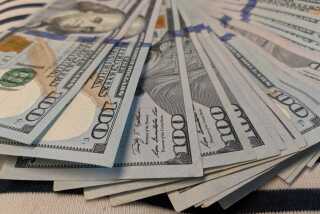Now May Be the Time to Bet on a Stronger Dollar
- Share via
Change amid paradox. Now may be the time to bet on the U.S. dollar gaining strength, even though global currency markets are still beating the greenback down in defiance of a strengthening American economy and increasingly competitive U.S. industry.
Sentiment in those markets may be about to turn as U.S. trade figures improve and the realization dawns that the economy can continue to grow for some time without sparking grievous inflation.
That could mean further rises in the stock market, declining interest rates for a while and, thus, better news in the bond markets. It also should mean a dollar exchange rate that rises above 100 yen and 1.50 German marks, the low points to which the U.S. currency has fallen this year.
That’s the view of some smart people who look a little ahead to global economic conditions in early 1995. “The cycle is turning now as other economies recover the ability to buy more U.S. exports,” says currency expert Edward M. Bernstein of Washington’s Brookings Institution.
“We’re in a watershed period in the international economy,” says economist Stephen Roach of Morgan Stanley, the New York investment firm. “As uncertainties about trade and policy are resolved, economic fundamentals will reduce the U.S. trade deficit.”
A dollar recovery could begin today, when the Commerce Department is expected to announce a slight improvement in U.S. trade figures--a gap of less than $10 billion in imports over exports in August, following an $11-billion trade deficit in July.
Then again, traders could sell the dollar and send its value even lower, because currency markets are not entirely logical. Witness Monday, when traders dumped dollars to buy German marks after the narrow reelection of Chancellor Helmut Kohl’s ruling party. Their emotion was relief that Kohl did not lose to the Social Democrats and thus could continue reform of Germany’s sclerotic economy, racked by 10% unemployment and grossly non-competitive industrial costs.
But such assumptions were false, say economists in Frankfurt. “Reform will proceed very slowly now; Kohl may be forced into coalition. That’s why German stock and bond markets did not rise after the election,” says economist Rainer Veit of Deutsche Bank Research.
As to the weak dollar and strong mark, that had nothing to do with Germany but “was due to homemade psychological factors in the United States,” says Veit.
What are those psychological factors? “Widespread lack of confidence in the Clinton Administration’s handling of the economy,” says Alan Shapiro, chairman of the finance department at USC’s School of Business Administration. That lack of confidence led foreign investors to reduce their purchases of U.S. stocks, bonds and Treasury securities this year.
And that produced a vicious circle: U.S. interest rates had to rise to attract investment to fund the trade deficit, which will grow to more than $100 billion this year (from $32 billion in 1992) because the U.S. economy was growing while others were not.
“The U.S. consumer is still the strongest economic factor the world has,” says one currency trader, noting strong demand for U.S. cars.
However, that active consumer sparked fears of inflation, which spurred yet higher interest rates, in turn hurting bond markets, business recoveries and hiring plans.
But now cooler analysis is coming to bear. Investment experts note that automobile plants are operating at a high rate of capacity but without bottlenecks. Widespread computerization is enabling industry to produce more with less input; productivity is rising, but not prices and wages.
The upshot is that U.S. industry is awesomely competitive just as economies in Europe and Japan are starting to grow again and developing nations in Asia and Latin America--which now take $250 billion, or 38%, of U.S. exports--are accelerating.
So the dollar will recover against the mark and yen and other currencies. And that will encourage more foreign investment in U.S. stocks and bonds and allow Americans to travel abroad again.
However, a new turn of the cycle won’t solve the underlying problem, which is that volatile currency fluctuations add costs to doing business worldwide. Clearly, a new agreement limiting those fluctuations is needed, says Edward Bernstein, 89, one of the architects of the 1944 Bretton Woods monetary conference that set up the postwar system.
And beyond currency agreements, a new understanding is needed to replace outdated notions that evaluate world commerce through trade deficits and surpluses. “Trade today is not a nation-state business,” says Alvin Toffler, author with Heidi Toffler of “The Third Wave” and “War & Anti-War in the 21st Century.” Rather it’s a multinational exchange of ideas and opportunities.
Toffler cites the example of a Malaysian entrepreneurial company, Technology Resources of Kuala Lumpur, that has created a satellite network through a partnership with a Ft. Wayne, Ind., company partly owned by Dan Quayle. That partnership then secured satellite launches from Russian space facilities and ground stations in the Tonga Islands of the South Pacific. “Malaysia, U.S., Russia, Tonga,” says Toffler, outlining the dawning new world of commerce.
Meanwhile, in the old world of flawed understanding and fluctuating currencies, the dollar is a good bet to recover.
More to Read
Inside the business of entertainment
The Wide Shot brings you news, analysis and insights on everything from streaming wars to production — and what it all means for the future.
You may occasionally receive promotional content from the Los Angeles Times.









